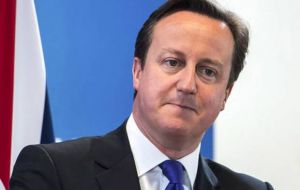MercoPress. South Atlantic News Agency
UK Parliament restless about Cameron's planned EU membership referendum
 Cameron's tactical shifts show the challenge he faces in keeping Tories united on an issue that helped topple his two immediate predecessors
Cameron's tactical shifts show the challenge he faces in keeping Tories united on an issue that helped topple his two immediate predecessors British Prime Minister David Cameron has suffered his first parliamentary rebellion since being re-elected last month as he tried to unite his party on Europe by making concessions on the timing and rules of a planned EU membership referendum.
Cameron, who has promised to try to renegotiate Britain's relationship with the European Union before the referendum, promised he would not hold the vote on May 5 next year, a date Euro-skeptic lawmakers in his Conservative Party had objected to, his second U-turn in as many weeks to try to placate them.
He also signaled he would partially agree to their demands to limit his government's ability to influence the Europe debate in the final four weeks of the referendum campaign.
Previously, Cameron had stated he was “open-minded” about holding the vote on May 5 next year, the same day as regional elections in Scotland, Wales and Northern Ireland.
But his spokeswoman said the government had introduced an amendment promising not to hold the vote on that date after listening to lawmakers who said May 5 was too soon to allow for proper debate and that it would be confusing to hold the referendum on the same day as the other elections.
Cameron's tactical shift shows the challenge he faces in keeping his party united on an issue that helped topple his two immediate predecessors, despite his winning a surprise outright majority in a national election just weeks ago.
His about-face came as members of parliament debated a law paving the way for the EU referendum by the end of 2017. Rebel Conservative lawmakers tried to vote through an amendment forcing Cameron to make even more concessions on the referendum. It was defeated by 288 votes to 97.
But 27 of those who voted in favor were from Cameron's own party, which has 330 lawmakers in total.
The rebels said they were concerned that the rules he was proposing for the referendum would unfairly skew the vote.




Top Comments
Disclaimer & comment rules-

-

Read all commentshttp://www.dailymail.co.uk/news/article-3128484/Shocking-moment-shoppers-wrestled-Tesco-supermarket-floor-scrambling-cut-price-food-like-scavenging-dogs.html
Jun 17th, 2015 - 09:47 pm 0*1 what has the article on Tesco got to do with the UK European referendum???
Jun 18th, 2015 - 05:28 pm 0uummmmmmmmmmmmm????
Commenting for this story is now closed.
If you have a Facebook account, become a fan and comment on our Facebook Page!